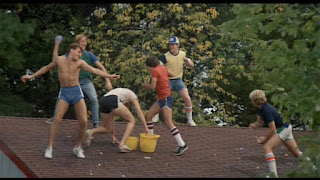I've watched some really excellent
horror movies the last few years. “Sleepaway Camp” is not one of
those. The movie is weird, cheesy, low-budget, nonsensical, and did
I mention weird? Perfect material for a cult classic.
The story starts on a lake in upstate
New York. A dad and his 2 kids flip their sailboat, and as they bob
in the water, a distracted counselor from the camp across the lake
runs them over, killing the dad and one of the kids.
Skip ahead a few years, and the
surviving kid, Angela (Felissa Rose), is now living with her weirdo
aunt. Angela and her cousin, Ricky (Jonathan Tiersten), are heading
off to spend the summer at that same camp across the lake. Ricky is
an athletic, well-liked kid, and he tries to watch out for his quiet,
withdrawn cousin. Angela still gets bullied by other campers,
including the camp vixen, Judy (Karen Fields), as well as one of her
counselors, Meg (Katherine Kamhi). There's also a creepy camp chef
who tries to molest Angela.
What happens to all these malefactors
who transgress against Angela? It's no spoiler to tell you that,
one-by-one, they die in various, horrendous ways. The scenes are so
foreshadowed, and the acting so bad, that none of it is really scary,
but I will say that there are some good, low-budget, makeup effects
in this movie. Somebody in that department really gave it their all.
Otherwise, the movie is a hot mess, but just weird enough to be
watchable. Plenty of things in this movie make no sense at all, like
why Meg, who looks about 18, would be romantically interested in the
70-something camp owner, or why the camp chef would be able to openly
leer at the young campers in front of his co-workers. The movie also
spends about 10 minutes on a campers-counselors baseball game that
winds up having nothing whatsoever to do with the rest of the story.
Fortunately, Jonathan Tiersten is actually a halfway decent actor.
Karen Fields and Katherine Kamhi aren't winning any Oscars, but they
chew up the scenery and clearly enjoy their villain roles. Felissa
Rose doesn't really do any acting as Angela, she just gives this
blank, wide-eyed stare to everyone. That stare is actually the
third scariest thing in the whole movie.
In any slasher movie, there are two
big questions: “Who will die next?” and “When are we gonna see
some more titties?” “Sleepaway Camp” differs from the rest, in
that the answer to the 2nd question is, never. In this
movie, the girls keep their 1-piece bathing suits on, while the guys
strip down. When they aren't showing off their bare asses, the dudes
wear little short shorts and cropped, mesh shirts that would be at
home in an '80s Pride parade. Oh, did I mention there's a scene with
two men in bed together? As queer cinema goes, “Sleepaway Camp”
is even gayer than “Top Gun”.
Oh, what are the scariest and second scariest things in the
movie, you ask? The second scariest is Angela's bizarrely-perky aunt. I don't have words to describe how strange she is, but she made my skin crawl. As for the scariest thing, I'm not gonna tell you. “Sleepaway Camp” has
one big twist, and I won't ruin it for you. As schlocky as it is, if
you're into this sort of cult classic, this is one you should
probably see.
2 stars out of 5, but on a cult classic
scale, 4 out of 5













